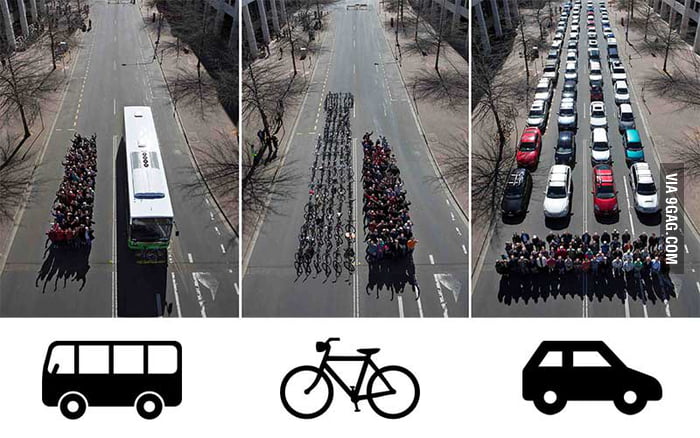This is pure oil company propaganda. I hate cars with a passion and want a car free society. We will get there but it will take time. But We need to get rid of gas NOW.
Anyone who spews this kind of filth is literally the enemy.
I really do not think so. Oil propaganda would support cars rather than be against it. I’m quite sure this is directed at the people who think EVs are a full solution.
This comic ISN’T anti-car, it’s anti-electric car.
Absolutely oil propaganda.
I already discussed this exact thing once before on Lemmy, I’ll link to my old comment chain https://lemmy.blahaj.zone/comment/3441189
And some other of the artist’s comics https://twitter.com/GregVann/status/1085788036573540354
But in short, no, in context this artist is anti-car.
Why, then, does the picture with all the problems depict a gas car, and why is “tailpipe emissions” listed as one of the problems?
Also, usually corporate propaganda is done by less well-established cartoonists that don’t have reputations to ruin.
Because people like you eat it up.
It’s criticising cars in general, one if it’s arguments is that EV’s don’t solve some lf the main problems of cars (which gas cars also have)
Is your reading comprehension in the shitter?
Mate, the whole comic shits on cars as a whole, each and every part that electrics and gas both share. The only thing making electric better being tailpipe emissions and nothing else.
The messaging here is clear, eliminate the car as a concept for transport and stop accepting lukewarm solutions as anything but unacceptable.
Why would Big Oil support cars that don’t use its product?
deleted by creator
the people who think EVs are a full solution.
Those people don’t exist. These kinds of arguments are only made to cause disagreement. It’s like car-racism.
Did you really just say car racism lmao.
No, I said it’s LIKE racism, meaning that it has similarities.
Literally NOBODY thinks that EVs are a “full solution” to environmental damage or climate change or whatever the whataboutism is about this week.
It’s only beneficial to put this argument forward for two groups: Car manufacturers and oil producters.
Then why is my neighbour down the street spewing this shit on Facebook daily? He is not a car manufacturer or oil producter.
No, it’s because he has been lead to believe that the smug EV people are going to take his vehicle away. He has bought the lie and now he’s spreading the arguments that will fragment car owners so that nothing will ever change.
The entire purpose is to split car users and preserve the status quo.
This is the fuck cars community. We should hate all cars equally. When I see other posters here repeating the lies from the car and oil industries, I have to point it out.
My brother in Christ, you literally have no idea how much stuff is made out of petrochemicals, do you? Try asphalt, industrial solvents, cosmetics, any real lubricant, fertilizers, pesticides, textiles, circuitry, detergents, insulation, PVC, paint, adhesives, roofing material, synthetic rubbers, as well as a ton of pharmaceutical products and food additives. And that’s not even an exhaustive list. Gasoline is a big part of the petrochemical industry, but it’s not the totality of it.
I do know how much we use petrochemicals. Gasoline is not a direct synonym for petrochemicals, it’s definition is fuel for combustion engines. None of the products you mentioned are made out of gasoline.
The funny thing is, electric cars help with the tire/brake dust and mined materials issue. Regenerative braking reduces the wear on brakes, and electric motors provide smoother power delivery, which reduces tire wear. As for the mined materials, electric cars generally take more material to make, but they are also easier to recycle, and the batteries themselves are able to be recycled in to even better batteries that they were when brand new.
I don’t feel like grabbing the source right now but EVs give off higher amounts of tire dust due to their heavier weight.
I’m curious why you think ocean microplastics can stick around for a few more decades or centuries
Even if we ignore microplastics, steel wheels on rail are significantly more efficient than tires. Rail is just better unless you are going to places not traveled much.
I was gonna argue that rolling resistance doesn’t have a large impact on efficiency, but apparently I was wrong
https://en.m.wikipedia.org/wiki/Rolling_resistance
An example of a very light high-speed passenger train is the N700 Series Shinkansen, which weighs 715 tonnes and carries 1323 passengers, resulting in a per-passenger weight of about half a tonne. This lighter weight per passenger, combined with the lower rolling resistance of steel wheels on steel rail means that an N700 Shinkansen is much more energy efficient than a typical automobile.
It’s really counter intuitive to how we think of rolling resistance.
https://piped.video/watch?v=tfA0ftgWI7U
This video helped explain to me how the material the wheels are made of does impact the rolling resistance because the wheel deforms.
But We need to get rid of gas NOW.
That’s fine, but electric cars are only moving the gas right now.
Moving the gas?
Are you saying that EVs produce the same CO2 as ICEs? Even if an EV is charged 100% off natural gas it will create less CO2 than an ICE. A gallon of gasoline is 33.7kWh of energy. This means a basic Model 3 has a battery with less than two gallons of gasoline worth of energy. They don’t idle, they don’t rev, they don’t make noise… all of these are significantly better for cities.
Then there’s the other shit about how ICE cars don’t just create CO2, they release a lot of other chemicals into the air that we shouldn’t be breathing and unlike a power plant, they do it almost always where people are.
Anyone who thinks cars are a solution to anything is my enemy.
Ugh guys come on, don’t let perfect be the enemy of good (or better). We cannot snap our fingers and fix everything. Incremental steps are necessary.
Local commuter rail, walkable cities, and nationwide high speed rail are all necessary to completely eliminate 90% of individual car ownership. We should be advocating for these systems of convenience which will make car ownership obsolete while incentivizing EVs while the infrastructure is built up, not demonizing EVs and making them appear as useless and a waste of time for helping fight climate change. Plus we need EV utility vehicles and trucks for professionals who need them to do their job.
Incremental steps are not personal EVs. They are diesel and electric buses. EVs eliminate 1 problem (tailpipe emissions) while creating 2 more (battery manufacturing, increased vehicle weight making road and tire wear worse, and making them more deadly - there’s others, take your pick) and not addressing the other hundred problems with car dependence.
Buses use the same infrastructure as cars. Bus stops are stupid cheap in comparison to anything else. And then, bus lanes can be implemented to prioritise buses and keep them from getting stuck in traffic.
The number one (by a long way) selling vehicle in the US is a massively over sized truck. Designed to be so heavy to avoid falling under emissions laws.
There is no electric vehicle that comes even close to that. You want those people interested in electric cars. They don’t give a single fuck about what your think about buses and nothing you will ever do in your lifetime will change that. Ever.
Getting people into EVs is an across the board incremental improvement in the exact definition of the word.
You’re right about the massive benefits of transit and trains in particular would be so amazing… but none of the people we want getting out of F150s give a single shit.
@xenoclast @ProgrammingSocks once you add a weight tax and special license qualifications they might start changing their tune
Yeah, but they’re also a pretty big part of the voter base, so how would you get that passed?
I don’t care about getting people into things. That’s a highly individualistic way to look at the problem. Car dependency is a societal problem, and marketing won’t solve societal problems. There needs to be a fundamental change in the way we (specifically the government) view transportation as a whole. (And as an extension to that, there also needs to be a change in regulation to close that loophole for light trucks.)
What’s important to me is getting lawmakers and those advocating to the lawmakers on board with funding public transit and making the streets safer for all people using them. Yes we need people on board too but really only enough to get these ideas in lawmakers heads as a major issue. A minority. The majority of people don’t understand or care and that’s fine, because their minds will start to change once they see it actually working. In the words of NJB, there are not that many car people, bike people, or train people. Most people just want to get to their destinations as quickly and efficiently as possible.
We don’t live in a direct democracy. 51% don’t have to explicitly agree to laws. The government passes laws that are bad for people and the majority disagree with all the time. Not saying the majority of people disagree, I honestly think they couldn’t care less. I’m just saying we don’t actually have to recruit hundreds of millions of people.
Unfortunately, a major part of this plan is going to have to restrict what oil companies are allowed to do and nowadays that’s seemingly impossible. Only seemingly though. Nothing is truly set in stone.
Ok you try riding the bus everywhere with your whole family dude. That’s not happening. It’s incredibly inconvenient. Especially given the infrastructure we have.
I’m loving my electric car and hope you all get one.
Having been to the UK and Germany, it’s incredibly convenient and much quicker than driving in many cases. I’ve used the metro where I live and it’s also much quicker, the only issue is the closest bus stop is 20 minutes away by foot. That’s easy to fix though.
I live in the UK, and I can say it depends greatly on your circumstances.
In general, if you’re traveling between an outside town to a city it’s usually an alright experience.
However, if your commute is between two outside towns then you have to be lucky, otherwise a car ends up being the only real viable option. My work is about 15 miles away, and before I had a car I had the only option of a railway line that ran through my town. If that line ever had issues getting cancelled or on the train strikes were on that day I couldn’t get to work because to get my work was 2 buses and 2 hours to go 15 miles. The train ran once an hour and didn’t call at half the stops on a Sunday including the stop I needed for work so if it was a Sunday I literally could not get to work.
It’s not even cheaper than a car when I factor in leisure travel, many places I regularly go to take longer to get to by car and are usually a worse experience whether that be service infrequency, long layover times or services getting cancelled/being on strike.
Oh sure, I agree that it’s not always perfect, but neither is driving. I can’t tell you how many times I’ve been randomly stuck in gridlock because someone got in a crash on the freeway.
The issue here is entirely that there is no choice that can be made. You either drive, or you don’t go anywhere. I don’t want to need a car, I want to want a car. Cars are convenient, but when they’re required to do literally everything then they’re a massive inconvenience.
If I was able to make a choice, I could share a car with someone else. As it stands, we both have to own one.
Having lived in Germany, you obviously didn’t meet enough people. They fucking love thier cars dude. Yeah their buses are better, but I was shown many people’s cars as if they were a child.
Oh sure, obviously people like cars, but in the cities we’d switch from car to rail because it’s significantly faster. I also stayed in the city for a couple of weeks and didn’t need a car at all.
Compare that to the US where you need a car or you die and it’s not even a contest.
I have an electric vehicle. I ride it everywhere in my city and it costs basically nothing. It’s an ebike. I’ve done nothing to it, it’s a normal 350w motor capped at 32 km/h. And damn does it feel so much better than driving in traffic.
It’s not that perfect (public transport) is more difficult than good (electric cars). More often good is the enemy of perfect since the industry is lobbying for it and against the other
Hence mocking Musk instead of guillotining him.
Climate change is a big enough problem that it is worth prioritizing.
I see them as “diet” cars. Similar to if someone is trying to cut back on sodas, switching to diet sodas is a net benefit. That’s not to say diet sodas are good for you or remotely healthy, they’re just less bad than the alternative.
Yeah, except the sweeteners they use to make diet sodas “diet” make those sodas just as bad, if not worse, than the originals.
Source? Because from what I’ve learned, they’ve studied aspartame so much now it’s almost silly, and it has never been proven to be “worse than sugar”. Though the sugar industry is really happy you believe otherwise.
Source please. (There isn’t one)
given the source of the energy most EVs use :/
What? This is hilariously wrong.
A profoundly filthy coal power plant has multimillion dollar filtration the size of your damn apartment. That gross coal is scrubbed more than the gasoline from any vehicle possibly could be.
In a first world country it’s not possible to have an electric car as dirty per joule as a gas vehicle.
Further, the powertrain is direct and therefore dramatically more efficient, so on a distance basis you get an additional multiplier. That’s where the EPA MPGe comes from - total energy content of 1 gallon of gasoline, converted to range on the electric vehicle.
That’s about 33 kWh in one gallon, which is about half the total storage capacity of my Bolt EUV 2023 (65 kWh) which has about 240mi of range on a full charge, which is why the MPGe is ~120mi/gal, which for an equally polluting power source as a personal gas vehicle, is 5-6x cleaner. Public DC fast chargers are frequently exclusively renewably powered.
It’s impressive because literally every possible angle of your statement is hilariously incorrect.
I wouldn’t say prioritizing rather than worth practicing. Corporations do much more damage than all the automobile drivers.
https://www.epa.gov/ghgemissions/sources-greenhouse-gas-emissions
Transportation (28% of 2021 greenhouse gas emissions) – The transportation sector generates the largest share of greenhouse gas emissions. Greenhouse gas emissions from transportation primarily come from burning fossil fuel for our cars, trucks, ships, trains, and planes. Over 94% of the fuel used for transportation is petroleum based, which includes primarily gasoline and diesel.2
To further break it down:
The largest sources of transportation-related greenhouse gas emissions include passenger cars, medium- and heavy-duty trucks, and light-duty trucks, including sport utility vehicles, pickup trucks, and minivans. These sources account for over half of the emissions from the transportation sector.
So the idea that transportation emissions from regular people is totally negligible compared to corporate excesses isn’t actually realistic. It’s a major chunk of it.
Exactly. We’re a minority but it’s still like 15%-20% of the overall problem that’s addressable.
Exactly. Corporations ABSOLUTELY are a problem we NEED to fight. But its also not an excuse to pretend we’re all completely blameless. People get furious when you tell them we cant sit around and wait for climate change to magically fix itself or billionaires to magically become good and stop. But that WE are going to have to actually make changes and put our money where our mouths are
To be clear this isn’t quite my own argument; even though I am saying that transportation emissions are too substantial to be ignored, I am skeptical of “personal responsibility” type solutions. I think it would be better to approach this with stuff like taxing companies based on employee commutes, taxing oil, urban planning and improved public transportation.
Even those require individuals to do something though. Since the government and basically every corporation is entirely opposed to this. You still have to march and protest and call your representatives and fight for it. There’s no reality where this ever changes with no one doing anything beyond an occasional Facebook post. However, even if suddenly our politicians and billionaires all had a change of heart, the necessary changes to effectively combat this environmental catastrophy would mean a complete upheaval of our lives. Cars and animal products either cease to be made or are so expensive barely anyone can afford them. We’ll be using public transportation and bikes and eating mostly vegan diets and bringing our reusable bags to our zero waste grocery stores. Itd force people to do all the things that various groups are already trying to get everyone to do (and to be clear im not sitting on my high horse claiming i already do all that, because i dont) There’s no way through this where we solve the problem and it doesnt require all of us to change our own habits
the necessary changes to effectively combat this environmental catastrophy would mean a complete upheaval of our lives
Yes. But that doesn’t mean it makes sense to frame things as being about who is ‘good’ and who is to be blamed, or that the impetus for change should be personal initiative to adjust away from unsustainable lifestyles. What’s needed is uncompromising policy solutions, and ones that are designed by experts to actually have a direct impact. People often get confused about what matters and what doesn’t, and proportionality. For instance restrictions on plastic bags at grocery stores is totally negligible for climate change, and arguably makes the situation slightly worse. Meat consumption has a significant impact globally, but in a first world context is relatively insignificant compared to the other things we do to create emissions. The problem isn’t that people aren’t choosing to live virtuously, since even if they did many attractive definitions of virtuous would not produce the needed results, and realistically that is not a viable way for human behavior to be adjusted anyway. The problem is that the circumstances around us shape our lives, and impel us to live in an unsustainable way, and that is what has to change.
Basically I think it just has to be more things like, accepting that deliberately high gas prices are a necessary sacrifice for the wellbeing of humanity, rather than asking everyone to choose to drive less and pat themselves on the back when they manage it and feel shame when they do not.
Can I just have good public transit, or safe bike lanes, I don’t even want a car.
I’m lucky enough to live somewhere with 24/7 public transit and generally walkable spaces. Some of my coworkers have moved out of the city to cheaper places and I’m just like yeah sure you pay less for rent or your mortgage, but now you’re in a car-first wasteland.
To keep in line with the meme, you must acknowledge that bikes also have pollution from tire wear and replacement, require road salt many places, causes accidents which lead to wounds or death of humans and animals and causes pollution from brake wear and manifacturing.
As the post clearly implies, if you can’t fix every issue with something simultaneously, then you should’t attempt to fix anything at all. /s
I don’t even think you have to fix every issue. Human existence by nature requires us to use and change our environment and our job is to minimize that so we can continue living on this planet.
Both of those examples solve our issues to a point where they’re non-existent. Yes, they’re still produced but they’re well within our manageable amounts and would reverse much of the damage we did if we did them on mass.
I’m not even necessarily against electric cars. I just don’t want one personally, I don’t think they’re great or even the solution, but they’re certainly better than combustion. They just still aren’t great, especially when we already have the actual solutions.
I’m not unsympathetic to the fuckcars movement, but I have to ask about the road salt. When it snows and the roads are icy, what’s supposed to happen? What’s the plan for getting around, for getting to work, for getting to school? We can be using beet juice and other less impactful de-icing brines, but you still need the cars to get people where they need to go. Is the argument that people should stay home? Are we suggesting that colder climates just shouldn’t be populated? Busses need the road salt, too. Trains and trolleys de-ice their tracks. Even urban areas where you can walk everywhere need to salt the sidewalks.
Where I live it’s common to spread gravel on the snow to increase grip. And then, of course, it is expected that everyone has the appropriate shoes and bike tires to not slip.
And even when salt is used, cars need a lot more salt per person than other modes of transport does.
edit: clarification
When I lived near a volcanic area, they used the cinders for winter grip. Played hell on car paint. So, add that to the runoff.
And even when salt is used, cars need a lot more salt per person than other modes of transport does.
Can I get a source on this? I’m not even sure what you mean by it, because salt clears active roadways as much as it does backroads, so how is this being measured “per person”?
Where I live it’s common to spread gravel on the snow to increase grip. And then, of course, it is expected that everyone has the appropriate shoes and bike tires to not slip.
You’re talking about pedestrians, but what about non-pedestrian traffic? The roads are more than just avenues to get to the grocery store, they’re also how the grocery store gets stocked with goods for rising out storms. It how the ambulance gets to you.
And what about the disabled or elderly? Can you get a wheelchair across the gravel?
This picture comes to mind:

For pedestrians and bikers, you need a lot less surface to deice, plus the lower speeds means it is not quite as vital to see all the snow gone directly. And yes, you will need roads for different purposes, but you would need a lot fewer of them, and with fewer lanes, if everyone wouldn’t take the car. Also, for supplying stores, a lot of the things trucks do can easily be done by trains.
If it’s cold enough to freeze the ground, I’m not riding my bike. First, having the right tires is one thing, but black ice and surprise potholes will eat your snow tires. Second, it’s going to be too cold to be out in the cold air for the several hours you need to bike to school or work.
Busses require the same amount of roads as cars. So you’re going to need the same amount of salt for busses. You might need less for sidewalks, but that’s only because people cannot walk as far as they can drive.
If everyone who normally takes the car would switch to taking the bus, all of a sudden you’d only need one lane in places where you previously needed two or three, because cars are very space-inefficient, so that makes a big difference.
Also, it’s not quite true that they’d require the same amount of roads. I don’t know about where you’re from, but where I live buses use about a quarter of the roads and you can still easily get anywhere by bus.
Additionally, salt isn’t used for rail vehicles at all.
When it snows and the roads are icy, what’s supposed to happen? What’s the plan for getting around, for getting to work, for getting to school? […] Are we suggesting that colder climates just shouldn’t be populated?
This line of questioning is really important, and it’s why I think there’s no addressing our devastation of the environment without digging deep into the assumptions of our society.
Society, as we understand it today, requires all of us going to work and school every day, no matter the weather, otherwise it doesn’t work. We can’t live like that. It just doesn’t work. We exist in the world, and our attempts to pretend like we are somehow apart or above it, that our daily lives shouldn’t be impacted by it, are destructive. We just can’t be in such a hurry all the time.
So yes, when the weather is bad, we need to slow down, focusing our efforts on our highest priority infrastructure, like ambulances, with everyone else taking a beat, or even pitching in. To do that, we need to rethink our society, because as things stand now, I agree with you, that’s not really possible.
This is why I think degrowth and socialism are the only human way through the climate crisis. Capitalism is a death cult of infinite growth that forces each of us to contribute to our own destruction every day because we have to get to work to live every single day.
Yeah, I think the argument is that you shouldn’t need the cars to get people where they need to go. This can be addressed two ways: either we don’t use cars or we don’t need to go (as far).
People should be able to travel with other modes that require less salt to deice, and cities could be built to not require cars for most trips. Salting sidewalks and bus lanes is better than salting those things plus roads and highways.
It’s also worth considering that yes, people should be able to just stay home. People shouldn’t be at risk of losing their job/home because they couldn’t safely make it into work. Parents shouldn’t have to rely on school as daycare.
I’d be curious to see if urban heat Island affects salt use. Maybe if we build dense enough, we don’t even really need salt to cover 99% of the population.
In Colorado we spray ‘sand’ which is still a chemical mix with actual sand, but less disruptive
This incidentally is why used school buses from Colorado are highly desirable in the skoolie community (a skoolie is a used school bus converted to a motorhome). In addition to the generally high-quality transmissions and retarders (essentially for handling mountainous terrain), the “sand” you use doesn’t promote rusting-out of the bus bodies like road salt does. In a sense, though, this is still bad for the environment: the extended lifespan of these vehicles keeps them on the road spitting out carbon dioxide longer then they otherwise would.
You can use a brine salt solution before it precipitates to reduce overall salt usage by 60-70%.
https://www.nytimes.com/2022/01/07/climate/road-salt-water-supply.html
Beet Juice? Do they remove the color or will everything be stained purple forever?
that’s processed sugar beet waste, not literal beet juice
I don’t think trains de-ice anything, no one’s out there deicing train tracks - they are far too remote
Depends on the location, but there are a few different strategies for trains in cold weather.
https://www.cnn.com/2019/01/30/us/chicago-train-tracks-fire-trnd/index.html
Here in Canada there are definitely de-icing/ snow removal machines used on the tracks. Large propane heaters keep switches clear of ice so they can operate. Hi-rail trucks will go ahead of trains through the mountain passes to ensure the way is clear. During particularly bad snow storms they can use machines like this to clear the snow.
The trains will also release gravel on the rail to improve braking times.
There’s literally a special type of train for clearing the tracks.
deleted by creator
As much as I agree, these are different things. EVs are fixing greenhouse gases. While the others are also bad things, they aren’t really global climate changers.
Except EVs still have a significant carbon footprint from their manufacture. So do train cars and buses, but to transport everyone in cars instead of public transportation would require orders of magnitude more materials, and therefore a much higher carbon footprint. Not to mention the poor land use that car dependency causes, which both leads to deforestation and impedes reforestation, which is a further climate change contributor.
EVs also have the ability to live longer. If an average EV is usable for twice as long as an ICE vehicle, its carbon footprint from manufacturing is already down to 50%.
So can transit vehicles, in fact they last even longer so I don’t see this as an advantage for EVs. In Vancouver, Canada for example, there are fully self-driving electric trains from the 80s that are still running perfectly fine today, and the only reason they’re getting scrapped soon is because they’re loud and uncomfortable compared to newer trains, which even then I personally don’t like the transit agency’s decision to scrap them because that’s super wasteful, they could probably run another 40 years with good maintenance.
Alright well that’s good. When the US shrinks down to the size of Vancouver maybe that will be a good option.
US can’t have good transit because it’s so much bigger than a single city.
The US doesn’t have cities the size of Vancouver, or municipal governments that can solve transit locally.
The country is simply to big for that.
The US has in fact shrunk down to the size of Europe which has excellent public transportation.
But alternatives we have and know to work solve both greenhouse gasses and local porblems.
We’ll have to stop driving gas cars specifically, but we’ll also just have to drive less in general.
Are they? Because unless you live in some green energy paradise, most EV are charged using coal plants.
Doesn’t need to be a “green energy paradise”, just a reasonably well connected first world country.
Take a look at Electricity Maps. Unless you live somewhere isolated or with very poorly developed grid infrastructure (or some central US states, apparently), you should see a non-trivial amount of electricity being generated by non-fossil fuels. For example, at the time of typing this 77% of the electricity I’m using is low-carbon and 50% of it is renewable.
That’s the kicker. EVs don’t have to rely on fossil fuels to operate (but they can make use of them depending on the grid infrastructure). ICE cars on the other hand are burning fuel wherever they go.
Walking or cycling will always be the least polluting means of getting around, but if you really need a car then you could do a lot worse than getting an electric one.
@Mars @wrinkletip Hello, what century are you living in? The US gets only 20% of its electricity from coal and dropping fast. In CA it’s 0%.
Aside from that, EVs are so much more energy efficient that an EV using electricity from a coal plant still produces less CO2 than an ICE car.
Not op, but the material gathering and building of EVs is far more energy intensive and resource intensive than gas cars. They do even out but it takes a number of years on the road depending on the vehicle.
Additionally they are very heavy which requires more infrastructure maintenance and therefore more emissions.
That is to say EVs are not a sure fire improvement and it depends on the car, the place you are, the supply chain producing your car, where it’s going to end up, and your own driving habits.
Or we could just invest in rail instead of doubling down on private vehicles. Then we can be sure.
EVs may even lead to increased tire debris.
But less brake pad wear. The regenerative braking reduces a lot of the need for brake pads.
Source?
Regenerative braking is basically turning the motors into a generator to recharge the battery. If you brake regeneratively, you’re not using your brake pads at all.
Many EVs can have their settings adjusted to where 90+% of braking can be just regenerative.
Every mechanic who’s worked on one? Everyone who’s owned one?
Well, here’s a source to counter your anecdote
https://www.oecd-ilibrary.org/sites/4a4dc6ca-en/index.html?itemId=/content/publication/4a4dc6ca-en
Although lightweight EVs emit an estimated 11-13% less PM2.5 than ICEV equivalents, heavier weight EVs emit an estimated 3-8% more PM2.5 than ICEVs. In the absence of targeted policies to reduce non-exhaust emissions, consumer preferences for greater autonomy and larger vehicle size could therefore drive an increase in PM2.5 emissions in future years with the uptake of heavier EVs.
Thats pm2.5 in general, not specifically from break pads
I wouldn’t doubt people driving EVs may even have less sustainable lifestyles in general because of their absolved guilt from driving the EV. Not that the average driver matters much when considering cargo and air traffic.
This is actually backed by research.
Trams, trains, bikes. The Holy Trinity of sustainable transport that must be pursued instead of EVs for an actually livable planet.
Death to the car. Death to America.
I live in a city with about 2 million people. It has major sprawl and lots of guys with big trucks to compensate for little personality. The city has a brown haze floating over it that is a result of tailpipe emissions.
EVs may not be the solution to climate change, but they are helping my local area with air pollution. Well… they would if they were more popular. Every time a local buys an EV, ten more prosthetic penises are sold.
I love the childish smug energy of this comic which simultaneously suggests merely mitigating a serious problem is inadequate and also provides no proposed solution whatsoever. If solutions which have compromise because they are rooted in reality are a problem, I suggest finding a way to live in a world of fantasy.
Your right it is a childish problem because a child could think of the solutions you seem to be unable to, instead of cars we could use trains or bicycles, or just walk. Solutions from that fantastical world you lived in before you could drive.
It is straight up delusional to believe we could just flip a switch and not have cars anymore. And I also notice you still haven’t provided an actual solution outside of “just use trains, bicycles, or walk.”
Whenever I see takes like this, I just assume they aren’t from, or maybe have never visited, America. The majority of the country was built on the assumption of travel via automobile from public transportation (or the lack thereof) to urban planning to housing. For the country to function without cars, it would require massive renovations to rebuild cities vertically, install a vast and complex rail system, and completely alter the culture of work and trade. And we can totally do this, but it will be very expensive and take a very long time, and to suggest investing in EVs in the meantime is somehow foolish because it doesn’t fully solve the problem is a bit dense. You can do both at once, not that we are, to be fair.
Fully investing in sustainable public transportation and infrastructure is something that would have to take at least a decade, even with absolute maximum commitment. So, yes, anyone who thinks that you can “just switch to trains, bicycles, or walking” is incredibly naive and absolutely fantasizing. Not suggesting it can’t be done but we have to live in reality where cost, labor, time, and public interest are factors and those make “just” doing it a bit more complex.
@Tarcion @Not_mikey
Hello Tarcion
Happy to have you here joining this conversation. I completely agree that the USA will not stop driving cars overnight.
This is mostly because USA hasn’t even cottoned on the fact that cars are really bad for cities, the environment and humanity. (That’s not to say all cars and vehicles are bad, there are shades of grey, but those single occupancy short trips are really bad)
There is an amazing amount of information out there on how we get rid of cars. There are literally hundreds of YouTube channels, Podcasts and Blogs. It’s really good thought-provoking and inspiring stuff. None of them have a magic fix for Traffication (that is the name of a great book you should read), but together, they show an America, that is less car dependent is very much possible.
The very first part of this journey is to educate ourselves on this subject and share our knowledge with others. Which I hope you will do. If you want help finding information on a particular aspect of ending, Car Depdency ask me and I’ll point you in the right direction.
Cheers
LeeYhe first part of the journey is getting you to not sound like your from the 1800s.
I think everyone here, even the ones ‘fighting’ to save cars, can all agree cars are not good for the environment. It’s just some of us live in areas where the nearest store is 20 minutes away, never mind work or friends. The public transportation when running here barely gets used because the stops are still far away from where you need to go since everything is in BFE. So either you need to get sweaty walking where you need to go, or get an Uber and use a car anyway.
So, what’s your solution to that Mr. Lee?
@UrPartnerInCrime
Cool. So you do see there is a problem. That’s the important bit, and after that it’s about working for change.
The Fossil Fuels Industry has done a great job of making people feel guilty about their “CO2 Footprint” but I don’t think we should. The reason why you don’t have options is because the system the Fossil Fuels Companies have supported and encouraged for 100 Years have taken those choices away and created a situation when many lifestyles are only possible with cars.
So my advice to you is don’t worry about it, it’s not your fault you don’t have choices. Carry on as you are. If you can get a more efficient vehicle, that would be nice, but if you can’t afford one, no problem.
What you can do is support all those people, organisations, and politicians who live in cities where we can have transport choices. Vote for politicians who want transport choices. Support organisations that are fighting parking minimums, working for mass transit and bike lanes, in urban areas, where changes can be made.
We need to pick the low hanging fruit. Who knows, one day you might move to one of these places!Man, you talk in a way that makes people in your side not want to be on your side
@UrPartnerInCrime
Didn’t you like my solution?
I didn’t say we could just flip a switch, like you said it will be a long and difficult process, but it will take even longer if we continue to focus on evs as the solution. We could do both at once with unlimited funds and will but we don’t have that, there’s opportunity cost, each dollar we spend on ev subsidies is one not going to projects that can reduce emissions by a lot more like high speed rail and electric bus infrastructure, and currently were spending hundreds of billions of public and private money on evs while almost completely ignoring the other more sustainable solutions. The sustainability movement in the u.s. has very limited funds and public will, and to spend most of that on halfway solutions is short sighted. We need to focus all the resources we can into this because like you said, even with that it would take decades and were running out of time.
I do live in America and have for almost all my life. I have traveled all around this country and know that most of it is extremely car dependent. But my reaction to that is not the problem is so big, we should just do small incremental changes, it’s the problem is so big and were running out of time, we need to do a full 180 right now if I want future generations to not live in a hellscape.
All of this is also just about sustainability, cars are bad for a myriad of other reasons, like the comic says, along with discouraging exercise and exasperating income inequality, and anything that helps people realize how bad they are and denormalizes them is a good thing.
deleted by creator
We hate cars so much, we’ve come full circle to parroting fossil fuel industry propaganda against EVs, I see.
Death to the car, every car. It will kill is if we don’t employ radical solutions and just replacing every gas car with an electric ain’t magically saving the world.
Hell it might just make things worse, those rare minerals have to come from somewhere and have to go somewhere when we are done with them. I have little hope for any of this in a capitalist world.
I want public transport more than anything, but where I live there’s little to none, I can’t do anything about that other than voting for parties that apparently have little chance to win. What I can do is buy an electric car, sue me.
I just wanna say I appreciate people here making intelligent, good faith arguments on both sides without resorting to black or white thinking or getting too aggressive/ abusive.
I bet there are statistics on just how much space is wasted on cars (roads, parking space) but I don’t have them handy. It will probaly pretty maddening when only considering “urban” areas but I wonder if it’s more or less of 1% of the world’s total landmass …
I know that in the UK 1.3% of our land is road, so maybe the global average isn’t much lower
I’m tired of people looking at me crazy because I keep suggesting we need better public transportation rather than fucking electric cars. We are 100% going to replace every car in America with an E.V before we ever expand access to public transportation. And we will do this because the car manufacturers stock prices will go up if we do.
























